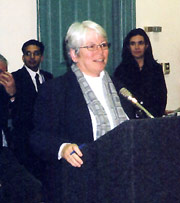|
Bay Weekly Interviews... ~ Bay Weekly Interview ~ with Sandra Martin If you know where you’re headed, you’re more likely to get there. That’s why photographer David Harp’s iconic images of Chesapeake Bay now brighten the walls of the room in Maryland’s capitol complex where the House Environmental Matters Committee deliberates the future of the Bay.
Headed by former U.S. Sen. Charles ‘Mac’ Mathias, those old friends and many new friends gathered at the dedication to start off this year’s House environmental deliberations on the right foot. Mathias told the gathering of decision-makers that, considering how much still needs to be done since “we started 30 years ago … standards cannot, unfortunately, be voluntary matters.” Then Mathias, who McIntosh welcomed as “the father-figure of Bay restoration,” asked that “the sacrifices and burdens be shared by all the Bay community.” That’s exactly what McIntosh has in mind as she leads the House Environmental Matters Committee through this year’s docket, as she told Bay Weekly when we pulled her out of the rush of legislative deliberation. Bay Weekly By way of introduction, tell our readers about your environmental views and background and the values that likely influenced House Speaker Michael Busch in choosing you last year to chair this important committee. Maggie McIntosh I didn’t come into the legislature on environmental issues, but since I arrived, I’ve scored 100 percent on the League of Conservation Voters legislative scorecard a few years in a row. That’s in part because of my own values and in part because of overdevelopment. To somebody like me, who lives in the city, [McIntosh represents Baltimore City and a fragment of Baltimore County] developing existing neighborhoods makes more sense than sprawl. I’ve always enjoyed the outdoors — I love to kayak; that’s how I use the Bay and its tributaries — and my appreciation makes me supportive. Bay Weekly From all indications, this session will be hamstringed by budget problems and spend much of its time debating slot machines. Given those realities, what is the lay of the land for environmental issues? Maggie McIntosh The prospect is actually fairly decent. The governor has proposed a surcharge, basically a flush tax on people hooked up to sewer plants. Nutrients are the number-one issue when you talk about preserving the Bay, and that’s the next big bite of the apple. We’re also going to revisit farm nutrient management plans this year, going through and making them more user friendly but also stimulating more farmers to come into compliance. One other is a fee bill that’s a no-brainer. It’s very narrow in scope and pretty much agreed on by both developers and the business community on the one hand and the environmental community on the other. It sets up for the first time a fee for wetland permitting. Basically, if you need to have a permit to develop and that takes an inspection, they’ll charge a fee. This will help on the enforcement side to make sure wetlands are not being developed or disturbed illegally. It will also help on the business side, with replenishment to move development along in a timely fashion. The money will be dedicated to Maryland Department of the Environment, helping it to be more user friendly and do more in the way of enforcement. Bay Weekly What do you think of the flush tax? Maggie McIntosh I like it. I think a lot of us think it can be made into a better bill. It’s an idea that needs work. I’m going to work with the governor’s office and my senate counterparts and folks who come before this committee to voice their concerns. These are my principles: If we’re going to do this, do it right. That means everybody pays; we share the pain. Every family — even those on septic tanks and wells — should contribute toward the health of the Bay. Nor must it all be on the backs of families. Businesses must pay their fair share. Look at what’s at stake. If the Bay goes bad — and that’s just what we’re already fighting — we all have to take ownership of the fact that it’s our economic engine and part of the attraction for people to live and grow up in Maryland. It’s our economic heart and also what gives us recreation, quality of life and what makes us unique. When the Bay needs our help, we all need to step up to plate. Bay Weekly Is everybody on board? Maggie McIntosh We’re hearing from small towns that feel big sewage plants will get all the money and they’ll not get any. We want it to be fair, but the truth is that some of the big plants are causing the most problems. You’ve got to triage this, and hopefully go after the plants that need help most.
I would point out to them that a family of three who gets charged a flush tax of $30 can’t just up their salary. But a business can in fact make adjustments of efficiency, just like families will have to do. My perspective is let’s keep it simple. Rather than make 48 amendments to satisfy every special interest, let’s just say everybody’s going to pay. We’re going to create a system where sewage treatment plants and septics are brought up to the new technology and brought up to the standard we want to set. Bay Weekly What are some of the ways you’d like to see the flush tax adjusted? Maggie McIntosh For the sake of Bay restoration, I’m hoping the governor’s flush tax will pass. But we also have to make people who have septic systems part of this bill somehow. For them, we need to include methods and help to bring them up to compliance with the latest technology. Another big question is how to determine fees for people not hooked up to public water or sewer systems. I’d also like to see some money for cover crops, which are a natural filter and another way of keeping nitrogen out of the Bay. In some areas of the state, particularly critical areas, getting more cover crops in would do a tremendous amount in filtering nitrogen out before it reaches the Bay. Bay Weekly Speaking of nitrogen, it seems that the poultry industry has gotten a free pass from the Ehrlich administration. The management plans the General Assembly put together in the late 1990s have been scrapped. Do you and your colleagues in the House feel any imperative to start regulating this polluting industry, or has the governor won? Maggie McIntosh The poultry industry will be affected by the flush tax. They use an extraordinary amount of water, and they’re already saying the tax unduly penalizes them. One of their lobbyists said it would cost a single plant $150,000 a year. But the industry can put a penny on the price of a chicken, while a family can’t go out and give itself a raise. They use a lot of water, and that water runs to the Bay. That is what we’re trying to get a grip on. I know of no other bills coming in that go back to regulating the industry in general. Bay Weekly What other environmental matters might we expect to see in this Assembly? Maggie McIntosh These are the big ones, though you might see some movement on labeling of mercury, with, I hope, some movement on e-waste recycling of computers and monitors that might have mercury. There may also be some bills on lead paint. There’s one thing more. The courts last year made a very bad ruling on critical areas, undoing the rights of local jurisdictions to do zoning in the critical areas. We have a bill coming in to rectify that ruling and increase fines for developing in critical areas. Bay Weekly Tell us more of the job and powers of a committee chair. Maggie McIntosh When a bill is introduced, it’s assigned to a committee. If it hasn’t been heard yet, we schedule public hearings so people can come in pro and con. We also get amendments from other legislators. I listen and try to see if I can bring the different points of view into focus. Then we reach a consensus on how the bill should be crafted. I bring the amended bill back for a vote and it goes up or down. Committee chairs have unique powers. I do have the power to keep a bill in committee. I could decide I just don’t like a bill and never bring it to a vote. Not this flush tax bill. It’s too important. But fees are very much on the minds of citizens. I will not pass a bill, particularly a fee bill, without bipartisan support. This bill will only pass with bipartisan support.
|
© COPYRIGHT 2004 by New Bay Enterprises, Inc. All rights reserved.
Last updated February 12, 2004 @ 2:21am.


